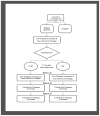Development of an integrated cognitive behavioral therapy for anxiety and opioid use disorder: Study protocol and methods
- PMID: 28689852
- PMCID: PMC5553551
- DOI: 10.1016/j.cct.2017.07.006
Development of an integrated cognitive behavioral therapy for anxiety and opioid use disorder: Study protocol and methods
Abstract
Opioid use disorder is a highly disabling psychiatric disorder, and is associated with both significant functional disruption and risk for negative health outcomes such as infectious disease and fatal overdose. Even among those who receive evidence-based pharmacotherapy for opioid use disorder, many drop out of treatment or relapse, highlighting the importance of novel treatment strategies for this population. Over 60% of those with opioid use disorder also meet diagnostic criteria for an anxiety disorder; however, efficacious treatments for this common co-occurrence have not be established. This manuscript describes the rationale and methods for a behavioral treatment development study designed to develop and test an integrated cognitive-behavioral therapy for those with co-occurring opioid use disorder and anxiety disorders. The aims of the study are (1) to develop and pilot test a new manualized cognitive behavioral therapy for co-occurring opioid use disorder and anxiety disorders, (2) to test the efficacy of this treatment relative to an active comparison treatment that targets opioid use disorder alone, and (3) to investigate the role of stress reactivity in both prognosis and recovery from opioid use disorder and anxiety disorders. Our overarching aim is to investigate whether this new treatment improves both anxiety and opioid use disorder outcomes relative to standard treatment. Identifying optimal treatment strategies for this population are needed to improve outcomes among those with this highly disabling and life-threatening disorder.
Keywords: Anxiety disorders; Co-occurring disorders; Cognitive-behavioral therapy; Opioid use disorder; Stress reactivity.
Copyright © 2017 Elsevier Inc. All rights reserved.
Similar articles
-
Cognitive behavioral therapy for anxiety and opioid use disorder: Development and pilot testing.J Subst Use Addict Treat. 2024 May;160:209296. doi: 10.1016/j.josat.2024.209296. Epub 2024 Jan 24. J Subst Use Addict Treat. 2024. PMID: 38272120 Free PMC article. Clinical Trial.
-
Behavioral strategies to reduce stress reactivity in opioid use disorder: Study design.Health Psychol. 2020 Sep;39(9):806-814. doi: 10.1037/hea0000862. Health Psychol. 2020. PMID: 32833482 Free PMC article.
-
Short-term intensive psychodynamic group therapy versus cognitive-behavioral group therapy in day treatment of anxiety disorders and comorbid depressive or personality disorders: study protocol for a randomized controlled trial.Trials. 2015 Jul 29;16:319. doi: 10.1186/s13063-015-0827-6. Trials. 2015. PMID: 26220089 Free PMC article. Clinical Trial.
-
Cognitive behavioral therapy for anxiety and related disorders: A meta-analysis of randomized placebo-controlled trials.Depress Anxiety. 2018 Jun;35(6):502-514. doi: 10.1002/da.22728. Epub 2018 Feb 16. Depress Anxiety. 2018. PMID: 29451967 Free PMC article. Review.
-
Cognitive behavioral therapy in anxiety disorders: current state of the evidence.Dialogues Clin Neurosci. 2011;13(4):413-21. doi: 10.31887/DCNS.2011.13.4/cotte. Dialogues Clin Neurosci. 2011. PMID: 22275847 Free PMC article. Review.
Cited by
-
Advancing preventive interventions for pregnant women who are opioid using via the integration of addiction and mental health research.Curr Addict Rep. 2020 Mar;7(1):61-67. doi: 10.1007/s40429-020-00296-x. Epub 2020 Jan 28. Curr Addict Rep. 2020. PMID: 32201680 Free PMC article.
-
Toward a Psychological Model of Chemical Coping with Opioids in Cancer Care.Harv Rev Psychiatry. 2023 Nov-Dec 01;31(6):259-266. doi: 10.1097/HRP.0000000000000384. Harv Rev Psychiatry. 2023. PMID: 37948154 Free PMC article.
-
Comorbidity of opioid-related and anxiety-related symptoms and disorders.Curr Opin Psychol. 2019 Dec;30:17-23. doi: 10.1016/j.copsyc.2018.12.020. Epub 2019 Jan 4. Curr Opin Psychol. 2019. PMID: 30711906 Free PMC article. Review.
-
Psychiatric comorbidity and order of condition onset among patients seeking treatment for chronic pain and opioid use disorder.Drug Alcohol Depend. 2021 Apr 1;221:108608. doi: 10.1016/j.drugalcdep.2021.108608. Epub 2021 Feb 15. Drug Alcohol Depend. 2021. PMID: 33667784 Free PMC article.
-
Randomized controlled trial of telephone monitoring with psychiatry inpatients with co-occurring substance use and mental health disorders.Drug Alcohol Depend. 2019 Jan 1;194:230-237. doi: 10.1016/j.drugalcdep.2018.09.010. Epub 2018 Oct 29. Drug Alcohol Depend. 2019. PMID: 30466040 Free PMC article. Clinical Trial.
References
-
- Substance Abuse and Mental Health Services Administration. Results from the 2012 National Survey on Drug Use and Health: Detailed tables. Substance Abuse and Mental Healt Services Administration; Rockville, MD: 2013.
-
- SAMHSA. Key substance use and mental health indicators in the United States: Results from the 2015. National Survey on Drug Use and Health; 2016.
-
- Rudd RA, Aleshire N, Zibbell JE, Matthew Gladden R. Increases in Drug and Opioid Overdose Deaths—United States, 2000–2014. Am J Transplant. 2016;16(4):1323–1327. - PubMed
-
- Conway KP, Compton W, Stinson FS, Grant BF. Lifetime Comorbidity of DSM-IV Mood and Anxiety Disorders and Specific Drug Use Disorders: Results From the National Epidemiologic Survey on Alcohol and Related Conditions. J Clin Psychiatry. 2006;67(2):247–258. - PubMed
-
- Carpentier PJ, Krabbe PFM, van Gogh MT, Knapen LJM, Buitelaar JK, de Jong CAJ. Psychiatric comorbidity reduces quality of life in chronic methadone maintained patients. Am J Addict. 2009;18(6):470–480. - PubMed
Publication types
MeSH terms
Grants and funding
LinkOut - more resources
Full Text Sources
Other Literature Sources
Medical


